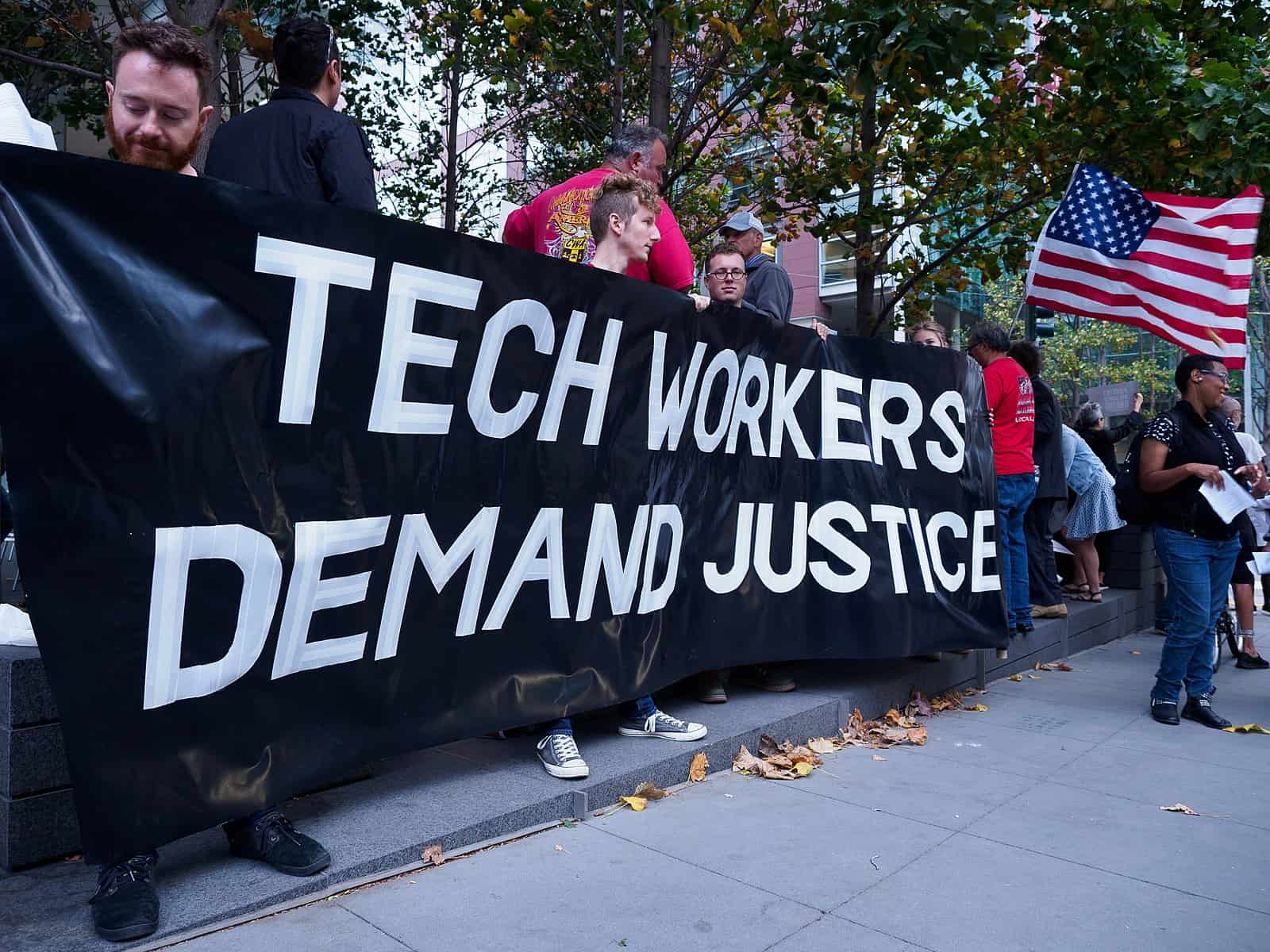
Jacki Silbermann is a student at Harvard Law School and a member of the Labor and Employment Lab.
This is the second post in a series of three. Read part one and check back tomorrow for part three.
Following part one’s brief overview of some of the issues at the center of recent and ongoing collective action in the tech sector as well as the present legal landscape, this second post examines three possible normative justifications for the claim that workers should have a legally-protected voice in employer business decisions when they carry significant moral implications. It should be noted that while tech workers are the case study in this specific research, the arguments posed here could just as easily apply to workers in other industries.
Systems Theory – Voluntarism
A systems theory approach to labor relations sees labor law as a framework for how workplace actors (employer and employees) engage with one another, not a determinant of the issues themselves. Considering the diversity of matters that may arise in each industry and workplace, labor relations are too complex to warrant a top-down approach, and state or court regulation of subjects of labor relations stifle much-needed complexity and flexibility. On that view, labor law should not proscribe tech employees’ demands regarding business morals because predetermined restrictions on subjects of bargaining or concerted activity go against the very nature of a labor relations regime. As explained in my previous post, the NLRA makes no provisions for the substantive terms of collective bargaining or labor disputes. It merely creates a legal framework for ensuring good-faith bargaining between sides to a labor dispute and protections for employee concerted activity.
Against this backdrop, one could argue that prohibiting tech workers (or any other workers) from leveraging collective power to influence business decisions to which they are morally opposed places an erroneous, external influence on the labor relationship. Consistent with a voluntarist approach, if employees consider the morality of employer business practices central enough to their working experience, then that should be enough to determine that such issues warrant strike protection or invoke a duty to bargain. Accordingly, Google or Amazon should defend their interests in continuing to develop technologies for use in warfare or maintaining ICE contracts at the negotiating table, not be immune to any such demands. Indeed, when collective bargaining and concerted activity is unrestricted in its subject matter, and when labor and management must, at the outset, negotiate any and every issue that either side desires (within the bounds of general law of contracts), the negotiation process is likely to be more honest and productive, yielding optimal results for all.
A significant drawback to voluntarism, however, is that it leaves weak unions or worker organizations with little bargaining power. While skilled, in-demand tech workers may be somewhat successful in negotiating changes to immoral employer business practices, weaker unions (particularly those of low-wage workers with high turnover) are unlikely to make such gains absent any stronger employer duty to bargain regarding such issues.
Industrial Democracy
Industrial democracy constitutes a system of workplace governance that incorporates worker participation in decision-making, helping to ensure that management does not dominate workers nor infringe upon their liberty or autonomy. According to this idea, workplace organizing is meant to strengthen worker participation in decisions that affect their lives, much like how they are governed as citizens at the state level. Decisions that affect workers’ lives are not just about distribution of income and other material conditions of employment. An employer’s decision to do business in a way that supports a contentious social stance with deep moral or political implications significantly affects the manner in which workers see themselves and the nature of their contribution to society. Commenting on Google’s cloud business with authoritarian foreign governments and other actors known for civil and human rights abuses, former Google public policy official Ross LaJeunesse expressed that it “makes [Google workers] an accessory.” In their letter to Jeff Bezos regarding the sale of facial recognition software to U.S. law enforcement and its role in perpetuating racism, Amazon employees emphasized that workers see themselves as genuinely complicit in the social effects of their work product. Google, for example, would like for workers to take pride in the good that the company does in the world. But that sense of connection with the work is also present when the company does bad in the world – it cuts both ways. The industrial democratic idea that workers should have a right to fairly participate in workplace decision-making can support tech worker voice in the type of work that they are doing or with which they are involved as a part of their terms and conditions of employment when those decisions implicate workers’ own sense of morality.
Worker Property Rights
Worker influence over business decisions might be justified through workers’ property rights to the business as conceived by stakeholder theory, which posits that an economic stake in the firm provides some degree of property right to the firm and the decisions made within it. While present American labor law doctrine views the business and all of the work done within it as the employer’s and shareholders’ property, and therefore their decision-making domain, stakeholder theory opposes such primacy and suggests that the firm should maximize wealth and other interests for all participants holding a stake in the firm, including employees.
Tech workers could claim a stake in their employers’ businesses because, as mentioned, many see themselves as inextricably linked to the entire production process and are deeply concerned with the moral implications of the products and services that their work supports. Additionally, many have a stake in the firm’s public image. If, for example, consumers boycott Amazon services and products because of the company’s ICE contracts or its refusal to tailor production processes in order to slow climate change, Amazon workers might feel the effects of that negative public image on their paychecks or other benefits. Beyond a purely economic interest, workers have an interest in their employer’s public image because that image also reflects upon them. For many, work is a source of self-fulfillment and purpose. Many take great pride in working for a company that does good in the world. Google’s famous (now unofficial) motto “don’t be evil” was a main selling point for many idealistic tech workers. There is a strong link between workers’ identity and that of their employers, many times of their employers’ own making. When their employer does wrong, workers may be seen by their family, friends or wider community as complicit by association.
If one accepts the premise of stakeholder theory, then given the different ways in which tech workers may hold a stake in their employers’ business decisions, an argument can be made for their right to a voice in decisions that hold significant moral implications or dilemmas. That said, in the present moment, envisioning the firm as the worker’s property to some degree seems like an incredibly hard sell considering current judicial and societal conceptions of workplace property rights in the U.S., which view entrepreneurial decisions as the sole domain of business owners, and appear to eschew ideas that mimic some sort of co-ownership.
Continuing with this review of normative arguments for employee collective voice in employer business decisions that present moral dilemmas, the next and final post will address three, additional justifications.







Daily News & Commentary
Start your day with our roundup of the latest labor developments. See all
March 3
In today’s news and commentary, Texas dismantles their contracting program for minorities, NextEra settles an ERISA lawsuit, and Chipotle beats an age discrimination suit. Texas Acting Comptroller Kelly Hancock is being sued in state court for allegedly unlawfully dismantling the Historically Underutilized Business (HUB) program, a 1990s initiative signed by former Governor George W. Bush […]
March 2
Block lays off over 4,000 workers; H-1B fee data is revealed.
March 1
The NLRB officially rescinds the Biden-era standard for determining joint-employer status; the DOL proposes a rule that would rescind the Biden-era standard for determining independent contractor status; and Walmart pays $100 million for deceiving delivery drivers regarding wages and tips.
February 27
The Ninth Circuit allows Trump to dismantle certain government unions based on national security concerns; and the DOL set to focus enforcement on firms with “outsized market power.”
February 26
Workplace AI regulations proposed in Michigan; en banc D.C. Circuit hears oral argument in CFPB case; white police officers sue Philadelphia over DEI policy.
February 25
OSHA workplace inspections significantly drop in 2025; the Court denies a petition for certiorari to review a Minnesota law banning mandatory anti-union meetings at work; and the Court declines two petitions to determine whether Air Force service members should receive backpay as a result of religious challenges to the now-revoked COVID-19 vaccine mandate.